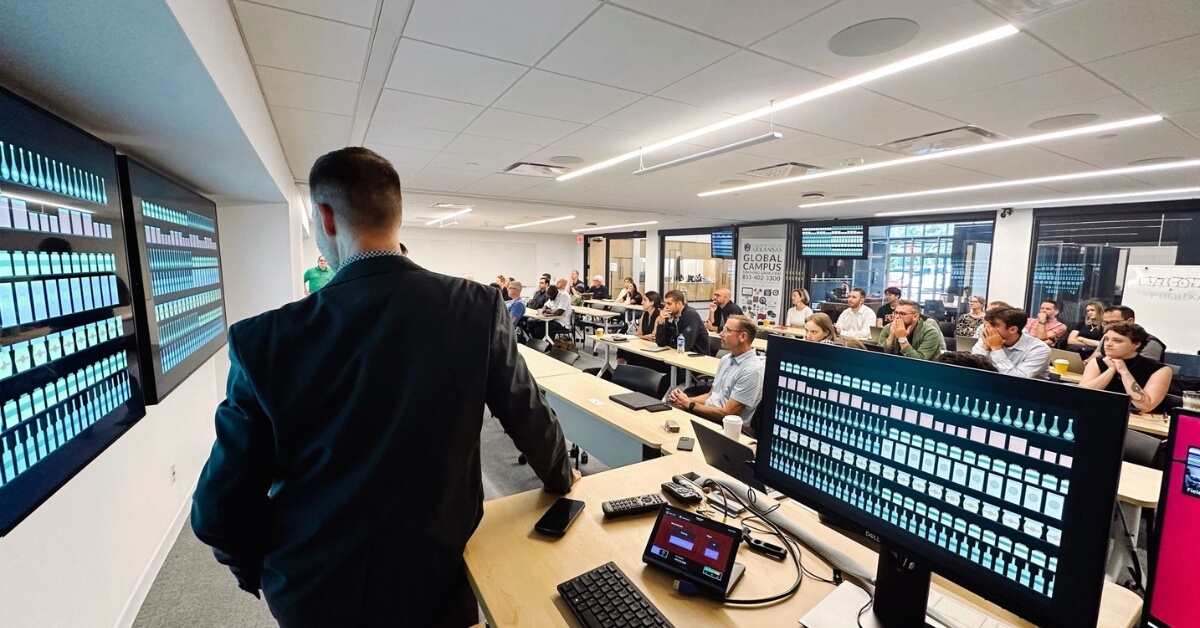Justin Urso has worn many entrepreneurial hats throughout his career, from co-founding Big Box Karaoke to leading a retail tech startup Skosay to serving as Director of the McMillon Innovation Studio at the University of Arkansas. Before diving into the world of entrepreneurship, he worked in three consumer packaged goods headquarters building brands. His extensive experience in sales, strategy, product management, UX, and team leadership has prepared him for his latest challenge—joining Fieldbook Studio as an Entrepreneur in Residence, where he is working on Triive, a retail-focused SaaS platform. His unique journey reflects a deep commitment to innovation and strategic thinking across multiple sectors. In a recent interview with us, Justin shared his experiences and insights on building startups, the advantages of the venture studio model, and the power of leveraging a strong network to bring innovative ideas to market faster than ever before.
From Traditional Startups to Venture Studio
Justin’s entrepreneurial journey began over a decade ago when he co-founded Skosay, at a time when the startup landscape in Northwest Arkansas was in its early stages and far from the much more robust ecosystem it is today. Reflecting on those early days, he recalls the limited resources, financial support, and infrastructure available to founders in the region. “When we started back then, we were navigating an industry that only had a few players, and we were doing it in a region that wasn’t known for startups,” Justin shared. Fast forward to today, Northwest Arkansas has blossomed into a robust startup ecosystem, providing founders with much broader access to capital, mentorship, accelerators, and a growing network of innovative thinkers inside and outside of our region. Now, Justin benefits from the well-established resources that have transformed the region into a powerhouse for startups, offering founders access to a wealth of resources, capital, and a seasoned team.
“The biggest difference for me now is the support network I have at Fieldbook and throughout Northwest Arkansas,” Justin said. “We have a whole team behind us that helps us through the design and engineering phases, and supports our go-to-market strategy, all in an effort to get us off the ground much faster than I could have ever imagined a decade ago.”
The Power of the Studio Model
One of the major advantages of building within a venture studio like Fieldbook is the access to resources that would otherwise take years to assemble on your own. “The studio model provides a variety of resources—design, engineering, go-to-market strategy—all in one place,” Justin shared. “When you put everyone together in a room for a week, you’re able to make rapid go or no-go decisions on products, which helps you move at a pace that’s hard to achieve outside of this environment.”
Justin also highlighted how the studio model enables founders to tap into a broader network of founders and mentors, fostering collaboration and accountability. “Being surrounded by like-minded people who are also working on big problems is incredibly motivating,” he noted. “It’s a great way to stay focused and make sure you’re moving in the right direction.”
Building Triive: Streamlining Retail Relationships
As Justin builds Triive, a B2B SaaS platform designed to streamline the relationship between brand representatives who work for retail brokers and suppliers, he’s excited about the potential to solve significant pain points in the industry. “There are about 30,000 new products introduced into the market each year, but only a small percentage actually make it to retail shelves,” he explained. Triive aims to reduce the amount of administrative work these representatives handle, giving them more time to focus on relationships, innovation, and selling. “We believe we can automate 20 – 30% of the back-office work, which is a huge time-saver for these professionals – all while increasing communication between the various parties.”
Justin is confident that Triive will make a meaningful impact on the retail industry by providing a simpler, more collaborative platform for both brokers and suppliers. With the support of the Fieldbook team, he’s been able to rapidly iterate on the product and is set to launch the platform within the next few months.
The Importance of Focus and Accountability
When asked about the biggest lessons he’s learned from his journey as a founder, Justin emphasized the importance of maintaining focus on the problem you’re solving. “In the past, I’ve chased revenue – because that’s what we had to do and it was easy to lose sight of the core problem we were trying to address,” he shared. “This time around, I’m staying laser-focused on serving our customers and solving the problem at hand.”
He also pointed out how the venture studio model provides a level of accountability that helps keep founders on track. “Having a team of people who are invested in your success, and who can support you, makes all the difference,” Justin said.
Advice for Founders Considering a Venture Studio
For founders thinking about joining a venture studio, Justin’s advice is clear: “If you’re looking to start a company with an extension of your team and access to resources that would take years to build on your own, the studio model is a great fit.” He emphasized that the model works best for early-stage founders who are still validating their ideas, rather than those who already have significant traction or revenue. “Yes, you have to give up some equity, but the access to resources and the speed at which you can build make it worth it.”










